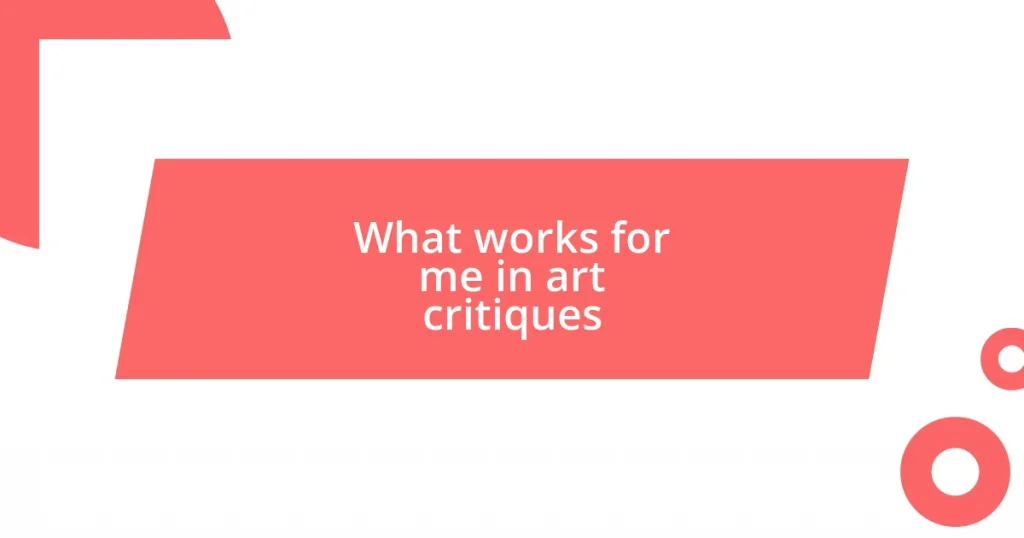Key takeaways:
- Literary magazines are essential for showcasing diverse voices, fostering community, and nurturing emerging writers.
- The experience of reading and submitting to these magazines invites deep engagement, reflection, and experimentation in writing.
- Networking through literary magazines can lead to collaborative opportunities, mentorship, and personal growth in the literary community.
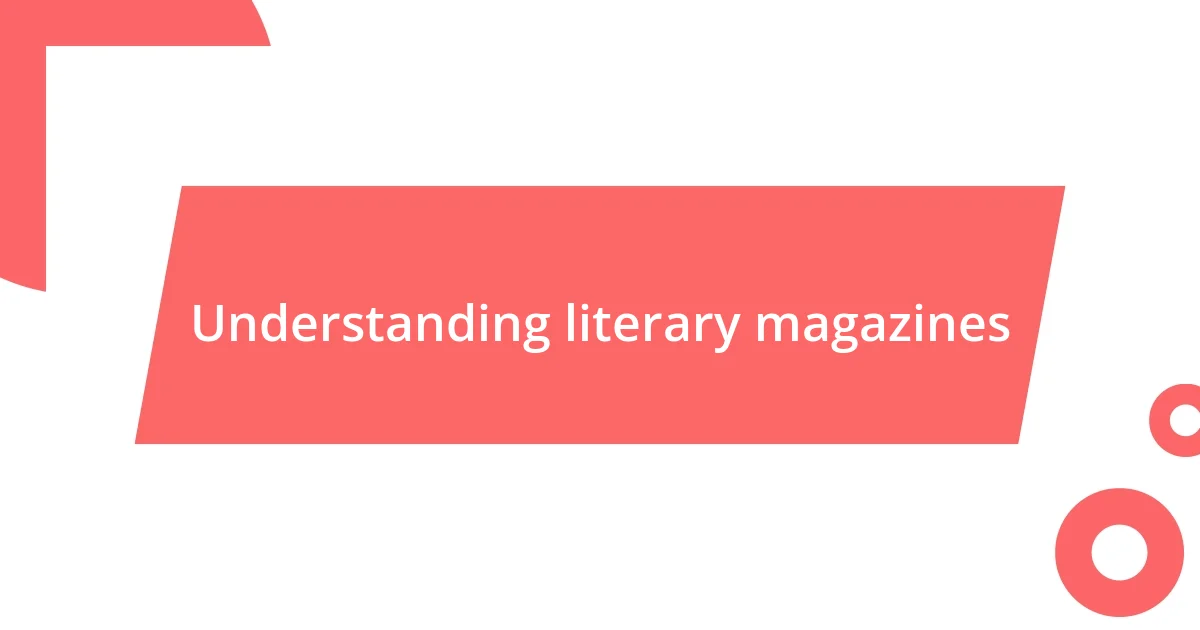
Understanding literary magazines
Literary magazines, in my experience, serve as vital platforms for both emerging and established voices. They offer a glimpse into the vast array of human experiences and emotions, showcasing how different cultures and perspectives can intersect through the power of storytelling. Have you ever found a piece in a magazine that felt as if it spoke directly to you? That’s the magic of these publications.
What strikes me is the diversity of formats and styles within literary magazines. From poetry to short stories and even essays, each piece attempts to capture a fleeting moment or a profound truth. I remember reading a poem that transported me back to my childhood, evoking all the nostalgia and warmth of simpler times. Isn’t it incredible how a few carefully chosen words can evoke such vivid memories?
There’s also a collaborative spirit in literary magazines that I truly admire. Writers, editors, and readers engage in a constant dialogue, exchanging thoughts and insights that shape the literary world. I once attended a reading where the connection between the author and the audience created an atmosphere brimming with creativity and inspiration. Have you felt that sense of belonging in a community? It’s a reminder that literature is not just about individual expression; it’s about how we connect with one another through shared narratives.
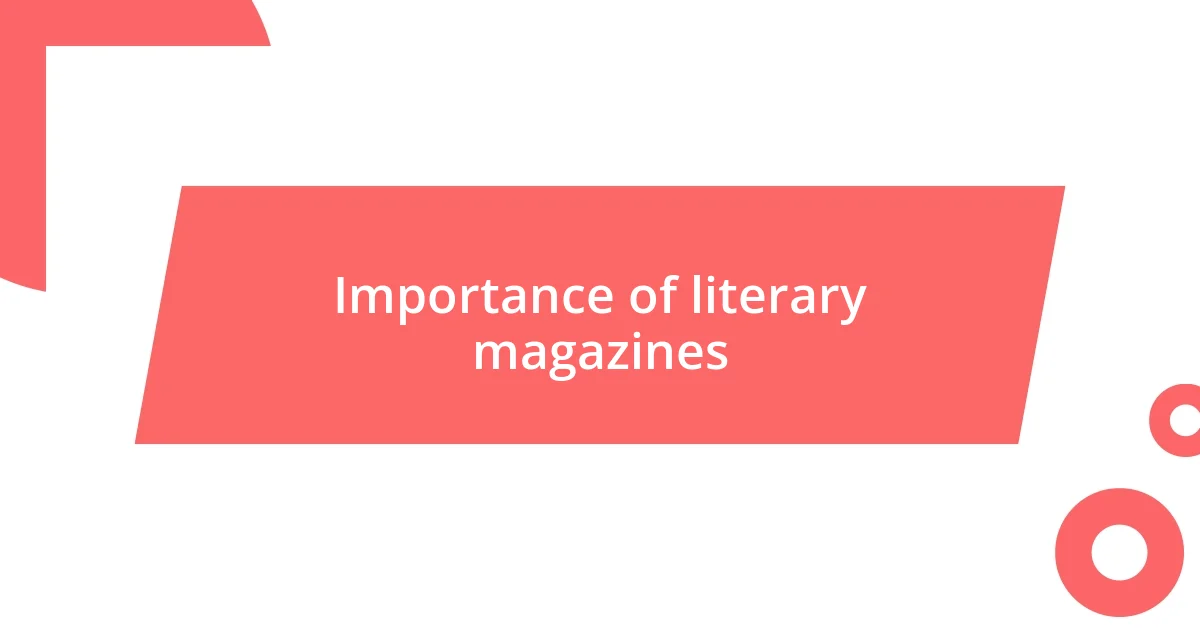
Importance of literary magazines
Literary magazines play an essential role in nurturing new talents and providing a space where innovative ideas can flourish. I remember when I first submitted my writing to a literary magazine. The thrill of seeing my work published alongside others’ pieces was both humbling and exhilarating. It’s a reminder that every submission is a stepping stone towards growth, and that community of writers encourages improvement.
- They promote diverse voices and underrepresented stories.
- They foster experimentation with form and genre.
- They offer readers a unique lens into contemporary issues and experiences.
- They connect writers and readers, forming a vibrant literary community.
- They often serve as launching pads for authors’ careers.
In that moment of discovery, I realized how literary magazines don’t just showcase stories; they create pathways for writers to be heard. Their impact extends beyond the pages, infusing the literary landscape with fresh perspectives and bold narratives. It’s exciting to consider how each edition acts like a snapshot of the zeitgeist, capturing our collective creativity, struggles, and triumphs.

Key features of literary magazines
When I think about the key features of literary magazines, their commitment to showcasing diverse voices stands out. Each issue becomes a curated collection that reflects the multiplicity of human experience. I vividly recall a story in one magazine that illuminated aspects of culture I had never encountered before. It was as if someone opened a window into a different world, and I felt both enriched and enlightened by the experience.
Another significant aspect is the editorial curation that happens within these magazines. Editors play a crucial role in selecting pieces that resonate with readers while also pushing boundaries. In my own journey, I’ve come across works that, at first glance, seemed unconventional. Yet, when I engaged with them, I discovered new ways of thinking about literature and art. Have you ever stumbled upon a piece that challenged your perspective? Those moments are the essence of what literary magazines offer.
Lastly, the thematic coherence often found in issues enhances the reader’s experience. Many magazines choose to center around specific themes, allowing for a deeper exploration of ideas. I remember reading an issue dedicated to “identity” and feeling a profound connection to various contributors’ struggles and triumphs. It’s a reminder that through shared themes, we uncover the interconnectedness of our stories.
| Feature | Description |
|---|---|
| Diverse Voices | Showcasing a variety of perspectives and experiences |
| Editorial Curation | Editors select pieces that resonate and challenge norms |
| Thematic Coherence | Issues often center around specific themes for deeper exploration |

How to read literary magazines
Reading literary magazines is an experience that goes beyond mere consumption; it invites reflection. I’ve always approached these magazines as a treasure trove of ideas. When I flip through the pages, I don’t just skim the text; I sink into each story, savoring the language and imagery. Have you ever found a sentence that lingered in your mind long after you read it? That’s the magic of engaging deeply with literature.
To truly appreciate the art within literary magazines, I recommend reading with an open mind. Often, I discover stories and poems that defy traditional structures. The first time I encountered an experimental piece, it felt jarring yet exciting. It sparked questions about the boundaries of storytelling and pushed me to redefine what I believed literature could be. In my view, each piece offers a unique perspective, challenging our assumptions and expanding our understanding.
Finally, I find it helpful to take notes while reading. This approach has enriched my experience immensely. I remember jotting down thoughts next to a particularly striking poem, capturing my immediate reactions. Looking back at those notes later, I noticed how my interpretations evolved as I reflected on the themes. Why not try this method yourself? It might deepen your connection to the work and provide insights you wouldn’t otherwise capture in a fleeting moment.
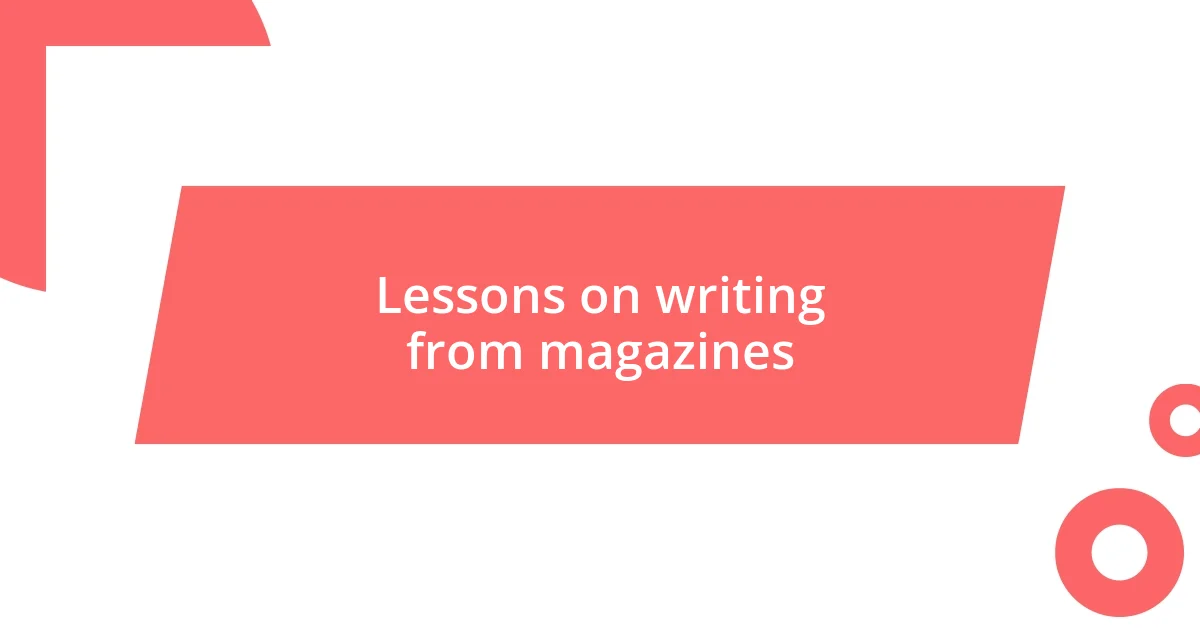
Lessons on writing from magazines
Writing for literary magazines teaches important lessons in style and voice that I deeply value. I remember submitting my first story and receiving feedback that highlighted the power of brevity. The editors suggested cutting down certain sections to make room for an emotional punch, and it was a revelation! It taught me that every word counts, and an economy of language can often leave a stronger impact. Have you noticed how some pieces resonate with you more because of their concise yet powerful format?
Furthermore, literary magazines often highlight the importance of experimentation. I stumbled across a nonlinear narrative in one issue that completely altered my perception of storytelling. It made me question the conventional beginning, middle, and end structure I was so accustomed to. By daring to challenge norms, I found new avenues for creativity, inspiring me to take risks in my own writing. Have you tried abandoning traditional structures? You might discover a whole new style that feels just right.
Lastly, I’ve learned that vulnerability in writing resonates profoundly with readers. I once read a personal essay that openly explored the author’s struggles with identity. Their bravery in sharing such raw emotions not only moved me but encouraged me to tap into my own experiences. It’s a lesson that reminds me: authenticity can create a genuine connection with readers, and there’s a certain magic in laying bare our truth. Have you considered how your experiences shape your writing? Embracing that authenticity opens new doors to engage your audience.
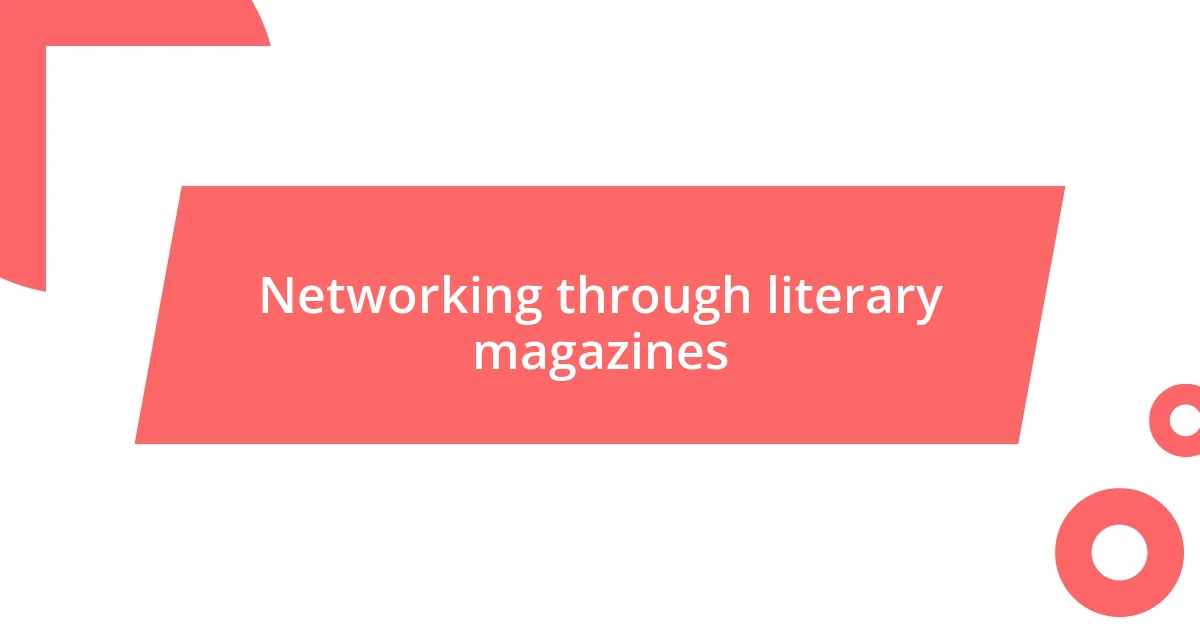
Networking through literary magazines
Networking within the realm of literary magazines has been an eye-opening experience for me. I remember my first submission not only led to personal growth in my writing, but also opened the door to a community of like-minded individuals. Connecting with fellow writers and editors over our shared passion has forged some of my most inspiring relationships in the literary world. Have you ever struck up a conversation with someone who shares your love for storytelling? It’s exciting to find that spark!
Engaging with literary magazine circuits has sharpened my understanding of collaboration. I once teamed up with an emerging poet featured in a publication, and our brainstorming sessions turned into creative explorations that pushed both our boundaries. This partnership illuminated the value of expanding one’s network; it’s not just about sharing your work but also about crafting new narratives together. How do you feel about collaboration? It can truly amplify the creative process.
Additionally, attending readings and events hosted by literary magazines has been a game changer for me. I remember one evening at a local bookstore where I met a seasoned author who offered invaluable insights into navigating the landscape of literary publishing. Those casual exchanges can lead to mentorship and opportunities you wouldn’t expect. Have you considered how attending literary events might enrich your own writing journey? Stepping out of my comfort zone in those moments has often unveiled new pathways I hadn’t thought possible.

Submitting work to literary magazines
Submitting work to literary magazines can be both thrilling and nerve-wracking. I remember my heart racing the first time I hit “send” on a submission, feeling a mix of excitement and fear. That moment taught me a lot about the pressures of vulnerability and the resilience it requires to present my work to the world. Have you ever felt that knot in your stomach just before sharing something deeply personal? It’s fascinating how submission feels like a leap of faith.
The guidelines of literary magazines vary greatly, which can be quite the puzzle. During one of my submissions, I overlooked the formatting requirements and received a polite rejection. While disappointing, it was a valuable opportunity to learn about the necessity of attention to detail. I quickly realized that each magazine has its own voice and style, demanding a tailored approach in submissions. Have you taken the time to dive deep into a magazine’s aesthetic before sending your work? Customizing your submission can make a difference.
What truly surprised me, however, was the importance of persistence. After multiple rejections, I considered giving up, but then I received a heartfelt acceptance from a small press that believed in my story. That experience made it clear to me that rejection is often part of the journey, not a reflection of my worth as a writer. Isn’t it comforting to know that resilience is just as vital as talent in the writing world? Each submission, whether accepted or not, builds experience and brings you one step closer to the right fit.













